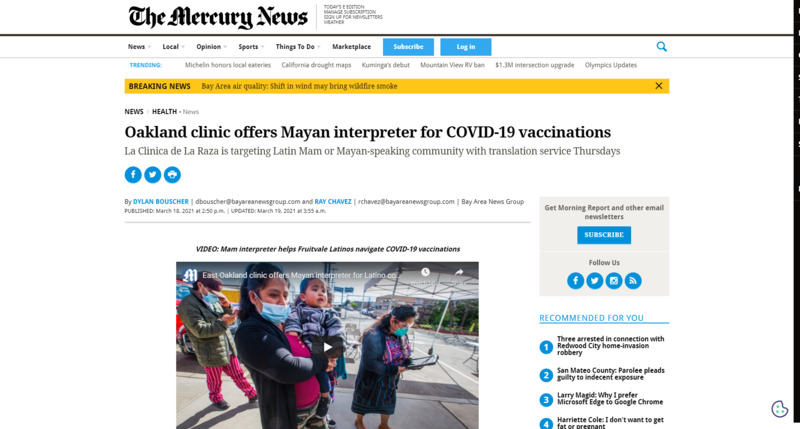Item
Oakland clinic offers Mayan interpreter for COVID-19 vaccinations
Title (Dublin Core)
Oakland clinic offers Mayan interpreter for COVID-19 vaccinations
Description (Dublin Core)
Oakland clinic offers Mayan interpreter for COVID-19 vaccinations
La Clinica de La Raza is targeting Latin Mam or Mayan-speaking community with translation service Thursdays
OAKLAND — A new COVID-19 vaccination clinic in the Fruitvale neighborhood is offering interpreter services for the Latin Mam or Mayan-speaking community.
This month, La Clinica de La Raza began offering the community-targeted vaccination service at 32 locations across the Bay Area, including ASCEND Elementary School on East 12th Street, where Latinos who speak Mam, K’iche ‘and Q’eqchi’ can get translation help from appointment to inoculation on Thursdays.
There are over 22 different Mam dialects spoken primarily by people of Guatemalan and Mexican descent. According to a recent UC San Francisco study, Mayan people with Guatemalan roots are the fastest-growing ethnic group in Oakland.
“I’m here to support my community, getting them the service that they deserve,” Brenda Sucely Perez, the on-site interpreter at ASCEND, said last week while about 450 eligible people were vaccinated.
Staff at the Fruitvale site have administered roughly 2,000 Moderna vaccines per week since opening on March 4, according to La Clinica officials.
Salvador Garcia, an Oakland firefighter, volunteered at the vaccination clinic.
“Coming to get the vaccination is a good thing because it would help prevent the spread,” Garcia said, adding that it’s especially important given how close relatives in the Latino community live.
“When you’re around people in such tight quarters around here, the way the families live with each other, it’s just good to have the preventative measure of the vaccination.”
It’s also one of the reasons the nation’s first and strictest stay-at-home orders proved ill-suited for the hard-hit Latino community, a four-month Bay Area News Group investigation found. That analysis showed case rates for the region’s Latino residents are nearly four times higher than White residents, while the Latino population has fared worse against the virus across California.
During the fall case surge, economic pressure to keep working outside the home became another major factor in the Latino community’s higher COVID-19 positivity rate in the Fruitvale neighborhood than the rest of the state, according to a UCSF study conducted in September.
The results of that study found that antibody-positive prevalence was 9.8% overall among people who live and work in Fruitvale, a predominantly Latino neighborhood. The number spiked to 26.8% among the Latin Mam, or Mayan, speaking community, USCF [sic] researchers noted. The COVID-antibody test shows that someone once had coronavirus.
La Clinica de La Raza is targeting Latin Mam or Mayan-speaking community with translation service Thursdays
OAKLAND — A new COVID-19 vaccination clinic in the Fruitvale neighborhood is offering interpreter services for the Latin Mam or Mayan-speaking community.
This month, La Clinica de La Raza began offering the community-targeted vaccination service at 32 locations across the Bay Area, including ASCEND Elementary School on East 12th Street, where Latinos who speak Mam, K’iche ‘and Q’eqchi’ can get translation help from appointment to inoculation on Thursdays.
There are over 22 different Mam dialects spoken primarily by people of Guatemalan and Mexican descent. According to a recent UC San Francisco study, Mayan people with Guatemalan roots are the fastest-growing ethnic group in Oakland.
“I’m here to support my community, getting them the service that they deserve,” Brenda Sucely Perez, the on-site interpreter at ASCEND, said last week while about 450 eligible people were vaccinated.
Staff at the Fruitvale site have administered roughly 2,000 Moderna vaccines per week since opening on March 4, according to La Clinica officials.
Salvador Garcia, an Oakland firefighter, volunteered at the vaccination clinic.
“Coming to get the vaccination is a good thing because it would help prevent the spread,” Garcia said, adding that it’s especially important given how close relatives in the Latino community live.
“When you’re around people in such tight quarters around here, the way the families live with each other, it’s just good to have the preventative measure of the vaccination.”
It’s also one of the reasons the nation’s first and strictest stay-at-home orders proved ill-suited for the hard-hit Latino community, a four-month Bay Area News Group investigation found. That analysis showed case rates for the region’s Latino residents are nearly four times higher than White residents, while the Latino population has fared worse against the virus across California.
During the fall case surge, economic pressure to keep working outside the home became another major factor in the Latino community’s higher COVID-19 positivity rate in the Fruitvale neighborhood than the rest of the state, according to a UCSF study conducted in September.
The results of that study found that antibody-positive prevalence was 9.8% overall among people who live and work in Fruitvale, a predominantly Latino neighborhood. The number spiked to 26.8% among the Latin Mam, or Mayan, speaking community, USCF [sic] researchers noted. The COVID-antibody test shows that someone once had coronavirus.
Date (Dublin Core)
Creator (Dublin Core)
Contributor (Dublin Core)
Type (Dublin Core)
news story
Link (Bibliographic Ontology)
Source (Dublin Core)
Mercury News
Controlled Vocabulary (Dublin Core)
Curator's Tags (Omeka Classic)
Contributor's Tags (a true folksonomy) (Friend of a Friend)
Collection (Dublin Core)
Date Submitted (Dublin Core)
07/03/2021
Date Modified (Dublin Core)
07/07/2021
08/05/2021
Date Created (Dublin Core)
03/18/2021
Item sets
This item was submitted on July 3, 2021 by Nicholas Harvey using the form “Share Your Story” on the site “A Journal of the Plague Year”: http://mail.covid-19archive.org/s/archive
Click here to view the collected data.
